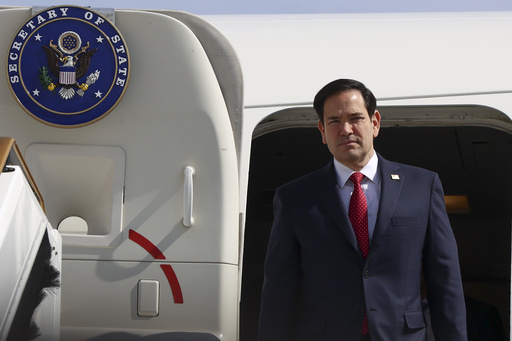
U.S. Secretary of State Marco Rubio has decided to forgo participation in a two-day meeting of foreign ministers from prominent wealthy and developing nations set to commence on Thursday. This decision follows his criticisms of South Africa’s policies, labeling them as anti-American.
Instead of attending the meeting, Rubio is returning to the United States after concluding his inaugural Middle East trip in his capacity as the nation’s chief diplomat. His travels included leading a U.S. delegation in discussions with Russian officials in Saudi Arabia concerning the ongoing conflict in Ukraine.
The State Department indicated that Rubio engaged with the foreign ministers of France, Germany, Italy, the UK, and the European Union’s foreign policy chief to provide updates following his talks with Russian Foreign Minister Sergey Lavrov on Tuesday.
Notable diplomats from Europe, along with Lavrov and Chinese Foreign Minister Wang Yi, are anticipated to attend the G20 meeting in Johannesburg. In contrast, the U.S. will be represented by a lesser-ranking delegation, a notable shift from typical expectations where a Secretary of State would advocate for American positions, especially at the dawn of a new administration.
Analysts interpret Rubio’s absence as reflecting a broader disinterest from the Trump administration in international institutions aimed at fostering cooperation. Rubio has openly rejected the priorities set forth by South Africa for its G20 presidency, which focus on themes of “solidarity, equality, and sustainability.”
As the first African nation to assume the presidency of the group, South Africa aims to elevate the concerns of impoverished nations, notably regarding debt restructuring and mitigating climate change effects. The developing world is particularly appealing for more financial support from wealthier nations in these areas.
Rubio, using the platform X, shared that he would also skip the principal G20 summit in Johannesburg scheduled for November, criticizing South Africa for leveraging the event to promote diversity, equality, and inclusion initiatives. He articulated that, “My job is to advance America’s national interests, not waste taxpayer money or coddle anti-Americanism.”
This move by Rubio signifies a marked decline in U.S.-South African relations, despite the latter being one of America’s prime trading partners on the continent. Recently, President Donald Trump issued an executive order halting U.S. aid to South Africa, citing a land law perceived as discriminatory and labeling South Africa’s foreign policy as anti-American. The order also condemned South Africa’s allegations against Israel in the UN regarding Gaza and its association with the Chinese Communist Party.
At the end of this year, South Africa is set to transfer the G20 presidency to the U.S., and the two nations are anticipated to collaborate under established G20 protocols despite present tensions. South African Foreign Minister Ronald Lamola remarked that the U.S. would still participate in the Johannesburg meeting “in one form or shape or another,” and he emphasized that Rubio’s absence does not equate to a total U.S. boycott of South Africa’s G20 efforts.
Experts on African politics maintain there remain avenues for the G20 to succeed under South Africa’s leadership, even with the U.S. showing limited interest in the current proceedings. Countries like the EU, Russia, and China have expressed backing for South Africa’s G20 presidency.
Oscar van Heerden, a senior researcher at the University of Johannesburg’s Centre of African Diplomacy and Leadership, noted that while nations prefer not to position themselves against the U.S., they understand that the driving forces behind U.S. foreign policy may not align with those influencing the EU or other G20 members.
European allies harbor their own anxieties about future collaboration with the Trump administration, especially after being overshadowed by its strategy of engaging in bilateral discussions with Russia earlier in the week. EU foreign policy chief Kaja Kallas voiced her concerns in South Africa, stating, “Multilateralism is under threat right now… We also need to use this opportunity to develop the international system further to be more inclusive for all countries in the world.”

